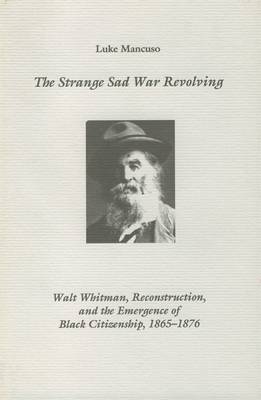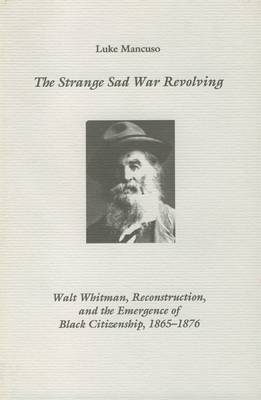
Bedankt voor het vertrouwen het afgelopen jaar! Om jou te bedanken bieden we GRATIS verzending (in België) aan op alles gedurende de hele maand januari.
- Afhalen na 1 uur in een winkel met voorraad
- In januari gratis thuislevering in België
- Ruim aanbod met 7 miljoen producten
Bedankt voor het vertrouwen het afgelopen jaar! Om jou te bedanken bieden we GRATIS verzending (in België) aan op alles gedurende de hele maand januari.
- Afhalen na 1 uur in een winkel met voorraad
- In januari gratis thuislevering in België
- Ruim aanbod met 7 miljoen producten
Zoeken
The Strange Sad War Revolving
Walt Whitman, Reconstruction, and the Emergence of Black Citizenship, 1865-1876
Luke Mancuso
€ 177,45
+ 354 punten
Omschrijving
Walt Whitman's prolific Reconstruction project has remained the most uncultivated decade in Whitman studies for over a century. This first book-length analysis points the way for a needed recovery of Whitman's 1865-1876 publications by considering them in the context of the legislative discourse of black emancipation and its stormy aftermath. While Whitman's Union ideology is virtually uncontested, the perceived absence of attention to race relations in his postwar texts has recently become a source of curiosity and a target of criticism. From 1865 to 1876, the Congressional "workshop" was seeking to forge interracial civil rights legislation. Congress's increasingly coercive surveillance of the implementation of such egalitarianism was manifested in the Civil War Amendments, the Enforcement Acts of 1870-1871, and the Civil Rights Act of 1875. Throughout this unsettled period, the Radical Republican agitation for civil rights on behalf of black Americans found unmistakable echoes in Whitman's textual images of the postwar Union. By yoking together literary and legislative discourses, this book provides a rhetorical pathway for the recovery of the emancipatory significance of Whitman's works of the Reconstruction decade. As a largely "unacknowledged legislator" in his day, Whitman had always demanded "Radical Democracy" as his central model for social solidarity. However, after the Civil War, the public presence of blacks had forced Congress to reckon publicly with the issue of black civil rights in the face of racism and sectionalism. By welcoming ex-slaves into the Union, Whitman's Reconstruction texts enlisted his representations in the federalizing rhetoric of civil rights protection that would lapse for almost a century, before being taken up again in the Second Reconstruction of the 1950s and 1960s. LUKE MANCUSO is associate professor of English at St. John's University in Collegeville, Minnesota.
Specificaties
Betrokkenen
- Auteur(s):
- Uitgeverij:
Inhoud
- Aantal bladzijden:
- 168
- Taal:
- Engels
- Reeks:
- Reeksnummer:
- nr. 12
Eigenschappen
- Productcode (EAN):
- 9781571131256
- Verschijningsdatum:
- 7/08/1997
- Uitvoering:
- Hardcover
- Formaat:
- Genaaid
- Afmetingen:
- 157 mm x 234 mm
- Gewicht:
- 408 g

Alleen bij Standaard Boekhandel
+ 354 punten op je klantenkaart van Standaard Boekhandel
Beoordelingen
We publiceren alleen reviews die voldoen aan de voorwaarden voor reviews. Bekijk onze voorwaarden voor reviews.









